- Mobile +91 – 09314722247
- hemsingh@rajasthanholidays.com
- jaipur@therajasthanholidays.com
JAIPUR – BIKANER- JAISALMER- JODHPUR- UDAIPUR- MOUNT ABU - UDAIPUR
DAY -1 JAIPUR :
Today morning, Arrival at Jaipur.
Jaipur - The capital of the state of Rajasthan is popularly known as the 'pink city' as the buildings in its old, walled city are all constructed in pink-colored sandstone. Jaipur owes its name, its foundation and its careful planning to the great warrior-astronomer Maharaja Jai Singh II (1699-1744). He laid out the city with its surrounding walls and six rectangular blocks by principles of town planning set out in an ancient Hindu treatise on architec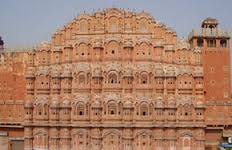 ture. In 1728 he constructed the remarkable observatory, which is still one of Jaipur's central attractions. It is worthwhile spending any leisure time wandering through the bazaars. Jaipur is well known for its beautiful carpets, enamelled ornaments, precious and semi-precious stones, brass ornaments and many other arts and crafts.
ture. In 1728 he constructed the remarkable observatory, which is still one of Jaipur's central attractions. It is worthwhile spending any leisure time wandering through the bazaars. Jaipur is well known for its beautiful carpets, enamelled ornaments, precious and semi-precious stones, brass ornaments and many other arts and crafts.
In the afternoon visit the Observatory, the Palace of Winds and the City Palace and Museum. The museum has an interesting textile section, which contains dresses and costumes of the former Maharajas and Maharanis of Jaipur.
Return to the hotel.
DAY 02 JAIPUR :
This morning after breakfast proceed to Amber Fort which is located at a distance of 11 kilometers from Jaipur. The fort is built with white marble and red sandstone. Thereafter proceed for a half day tour of the “Pink City”, visiting the Maharaja's Palace which is known as “The City Palace”.The City Palace complex covers a huge area, which is divided into a series of gardens, courtyards and buildings and now houses a museum containing rare manuscripts. Also visit Jantar Mantar the astronomical observatory built by Jai Singh, drive past Hawa Mahal – the palace of winds, its five-storey façade decked with no less than 593 finely screened windows and balconies. Also visit the Albert Hall Museum.
Overnight in Jaipur.
Amber Fort Hawa Mahal.
DAY 03 JAIPUR - BIKANER 330 KM :
After breakfast drive for Bikaner and enroute,explore the surroundings of Mandawa and later leave for BIKANER, (190 km), Mandawa, often referred to as Rajasthan’s open art gallery. Mandawa is a sleepy little typical Rajasthani town, which is deep rooted with cult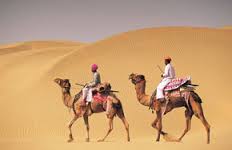 ure. Stay here in your heritage hotel, Castle Mandawa. Later enjoy a walking tour of Mandawa, which includes the medieval fort that gradually rises on the horizon like a mirage. A painted arched gateway adorned with Lord Krishna and his cows leads to the bazaar.
ure. Stay here in your heritage hotel, Castle Mandawa. Later enjoy a walking tour of Mandawa, which includes the medieval fort that gradually rises on the horizon like a mirage. A painted arched gateway adorned with Lord Krishna and his cows leads to the bazaar.
Bikaner which was once a major trading post between Africa, West Asia and the Far East. The arts prospered receiving the patronage of a wealthy merchant community. The city is renowned for the best riding camels in the world. This afternoon during your tour you will visit Camel Breeding Farms; Junagarh Fort, a formidable structure encircled by a moat and having some beautiful palaces within. Situated at a height of above seven hundred feet above sea level, it towers over the city and can be seen from a distance.
The fort and its palaces are profusely decorated with magnificent stone carvings. 30 kms south of Bikaner is the village of Deshnoke, where the famous Mata Karni Temple is situated. The 600-year-old temple is dedicated to Karni Mata, an incarnation of Goddess Durga. The temple plays host to thousands of rats that form the major attraction here. The rats are considered sacred and worshipped accordingly. You have to be very careful while entering the inner sanctum, because it is believed that if you accidentally step on a rat, a gold replica has to be made to compensate for the lost life.
Return to hotel for overnight stay.
DAY 04 BIKANER - JAISALMER:
After breakfast, drive 333 km to Jaisalmer - a fairy-tale town in the Thar Desert founded about 800 years ago by Rajah Jaisal. Unlike any other city, this desert fortress is one of Rajasthan's most exotic and unusual towns. Jaisalmer, an important ancient trading centre because of its strategic location on the camel trade routes, is often described as the 'golden city'.
The havelis, built by merchants of the 19th century, are exquisitely carved from golden-yellow sandstone and are still in a beautiful condition. The fort built by Rawal Jaisal in the 12th century, stands on the 80 metre high Trikuta hill, with beautifully carved Jain temples. The annual desert festival takes place in January and February each year and is a riot of colour and activity. Jaisalmer is also famous for its Silver jewelry, embroidery, Rajasthani mirror work, rugs, blankets, antique, stonework and camel safaris. Afternoon is free to walk around in the colorful and bustling bazaars.
Overnight stay at hotel.
DAY 05 IN JAISALMER:
After breakfast, leave for the city tour of Jaisalmer. Visit the famous Havelis (mansions) known for their frescoes. Jaisalm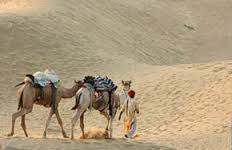 er's strategic position on the camel terrain route bought it great wealth. The merchants grew prosperous and commissioned great havelis, or mansions, to flaunt their ever-growing status in society. Made of local golden-yellow sand stone and wood, some of the havelis are still in excellent condition. The most elaborate and magnificent of all the Jaisalmer havelis is the Patwaon Ki Haveli. Five Jain brothers built the Haveli between 1800 and 1860. Salim Singh Ki Haveli and Nathmal Ki Haveli are the other two havelis that are opened to visitors. Built in 1156 by the Bhatti ruler, Jaisal, THE FORT here stands atop the 80 m high Trikuta hill.
er's strategic position on the camel terrain route bought it great wealth. The merchants grew prosperous and commissioned great havelis, or mansions, to flaunt their ever-growing status in society. Made of local golden-yellow sand stone and wood, some of the havelis are still in excellent condition. The most elaborate and magnificent of all the Jaisalmer havelis is the Patwaon Ki Haveli. Five Jain brothers built the Haveli between 1800 and 1860. Salim Singh Ki Haveli and Nathmal Ki Haveli are the other two havelis that are opened to visitors. Built in 1156 by the Bhatti ruler, Jaisal, THE FORT here stands atop the 80 m high Trikuta hill.
3 walls and features 99 bastions surround the fort. Over the centuries, the golden sand stone fortress witnessed many battles between the Bhattis, the Mughals and the rathors of Jodhpur. Within the fort complex lie the beautifully carved Jain Temples built between the 12th and 15th centuries. The Maharawals (rulers) of Jaisalmer were devout Hindus but were tolerant of Jainism, and encouraged art and religion. There are 7 temples in the complex - Chandraprabhu, Parasnath, Shitalnath, Sambhavnath, Shantinath, Kunthunath and Rikhabdev Temple. The temples are all connected by a series of corridors and walkways. Closeby is the Gyan Bhandar, a library founded in 1500 A.D. This house is priceless ancient manuscripts and other exhibits like astrological charts, besides the Jain equivalent of the Christian Shroud of Turin.
After lunch proceed for the excursion to Sam Sand dunes. Located at a distance of 42 kilometres from Jaisalmer, Sam Sand Dunes is the closest point to witness the total sandy desert. You can also see the patterns and motifs created by the shifting sands and air. Moreover, Sam Sand Dunes also provide you with an unforgettable experience of camel rides and the sunset.
Return to your hotel for overnight stay.
DAY 06 JAISALMER - JODHPUR:
After breakfast, today drive 285kms to Jodhpur, Call it by its many names and they will not do Jodhpur justice. An oasis in the ar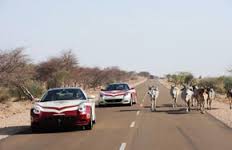 id Thar Desert, Jodhpur is the second largest city in the state of Rajasthan. Representing this colorful city with shades of blue, Jodhpur has a history that is rich and a present that beckons strongly to the discerning tourist. Forts and palaces, temples and havelis, culture and tradition, spices and fabrics, color and texture, Jodhpur has them all and in plenty. Situated in western Rajasthan, Jodhpur has long attracted both the domestic and outside tourist. It not only offers tangibles, in terms of what you can see and buy but also fills one with a sense of history and the splendors of an era gone forever. The hospitality of the locals, the demure women, the colourful turbans -all set against the unmerciful desert is something to feel, not just see.
id Thar Desert, Jodhpur is the second largest city in the state of Rajasthan. Representing this colorful city with shades of blue, Jodhpur has a history that is rich and a present that beckons strongly to the discerning tourist. Forts and palaces, temples and havelis, culture and tradition, spices and fabrics, color and texture, Jodhpur has them all and in plenty. Situated in western Rajasthan, Jodhpur has long attracted both the domestic and outside tourist. It not only offers tangibles, in terms of what you can see and buy but also fills one with a sense of history and the splendors of an era gone forever. The hospitality of the locals, the demure women, the colourful turbans -all set against the unmerciful desert is something to feel, not just see.
Every pore of Jodhpur tells its own tales of heroic tales that made legends out of kings and soldiers, romances that continue to warm the heart and a time when epics were lived out on the streets by everyday man. Visit the MEHRANGARH FORT in the afternoon. Considered one of India's best forts, this invincible stronghold of the Marwars sits on a steep hill lording over a wonderful view of its surroundings. It is also a beautiful fort and undoubtedly, the jewel of Jodhpur. Intricate latticed windows, elaborately carved panels and elegantly curved porches speak of beauty and taste. No matter what part of the fort you are in, its ambience will leave you in awe and your senses reeling. Take in the sight high up on the rampart where the second largest cannon in Asia rests. Also visit Jaswant Thada - a white marble memorial built in memory of Maharaja Jaswant II in 1899.
Return to hotel for overnight stay.
Mehrangarh Fort Jaswant Thada.
DAY 07 JODHPUR - UDAIPUR:
This morning we'll drive through valleys in the remote and peaceful Aravalli Range to RANAKPUR to visit one of the most important Jain temples in India. This marble complex is noted for the 29 halls supported by 1,444 pillars, each adorned with hundreds of carved figures, no two alike. We'll continue driving south, arriving Udaipur, described as the “City of Sunrise” in the evening. In the evening you will enjoy a leisurely boat ride on LAKE PICHOLA. With its main attractions being the two palaces on the islands in the lake, Jagniwas and Jagmandir Lake Pichola is about 4 km in length and 3 km wide. Jagniwas was earlier the summer retreat of the prince of Mewar and now a five-star hotel. The city palace extends along the eastern shore of the lake and you can go for a boat ride from Bansi Ghat.
Overnight at hotel.
DAY08 UDAIPUR:
Today depart for a tour of the Udaipur visiting The City Palace, now a museum, overlooking Lake Pichola. The Palace encloses a maze of courtyards, apartments and beautifully decorated halls.See The Marble Throne in the coronation rooms. Also visit the museums, the hall of public audiences, and Saheliyon-ki-Bari or ‘Garden of the Maids of Honour’. The “Garden of the Maidens” complex brings back the lavish lifestyle of the ladies of the court and their friends.Make a visit to The Jagdish Temple which enshrines a black stone image of Vishnu Jagannath, lord of the Universe.
Overnight in Udaipur.
City Palace, Udaipur Lake Pichola, Udaipur.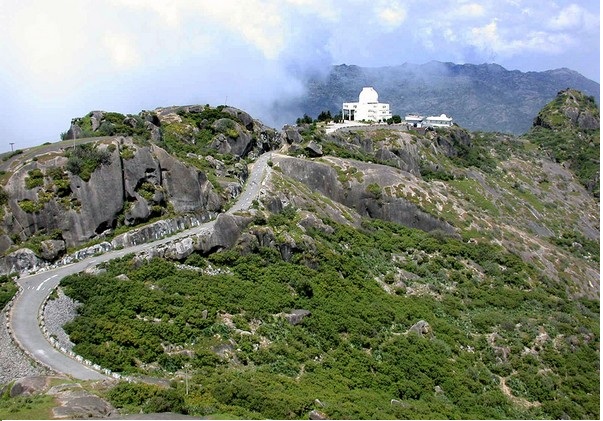
DAY 09 UDAIPUR- MOUNT ABU:
After breakfast, check out of the hotel & drive to Mount Abu which is the only hill station in Rajasthan nestling in picturesque Aravalli hills. Upon arrival, check in to the hotel. Take a short break and then visit the famous Dilwara Jain Temples. Dilwara Jain Temples were constructed between 11th and 13th centuries. After visiting the temple, proceed to Nakki Lake. This artificial lake is ringed by hills. In the evening enjoy a stroll down the bazaar up to Sunset Point from where you get a wonderful view of the setting sun.
Stay overnight at hotel in Mount Abu.
DAY 10 MOUNT ABU- DEPARTURE :